WordPress vs Hostinger Website Builder: Final verdict
Wordpress and Hostinger Website Builder both offer unique advantages, making them suitable for different types of users and needs.
Wordpress (Overall Grade: 7.1/10)
is an open-source content management system that excels in customization and flexibility. It is ideal for users who want extensive control over their website’s design and functionality. With a vast ecosystem of plugins and themes, WordPress is perfect for blogs, business sites, and online stores. However, it requires a steeper learning curve and relies on third-party hosting providers, which can affect performance and security.
Hostinger Website Builder (Overall Grade: 7.1/10)
is a user-friendly platform designed for beginners and non-technical users. It offers a drag-and-drop interface, making website creation accessible to everyone. Hostinger Website Builder provides a range of templates and built-in AI tools, making it easy to set up and manage a website or online store. While it may lack the extensive customization options of WordPress, it offers reliable hosting and strong customer support, making it a great choice for small businesses and individual sellers.

|

|
|
|---|---|---|
Design functionalities & templates |
9.0 |
8.5 |
Ease of use |
7.2 |
8.3 |
Ecommerce |
8.4 |
6.1 |
Website editors |
8.5 |
7.4 |
Product testing options |
8.1 |
6.7 |
Price |
5.9 |
9.0 |
Hosting quality |
0 |
7.2 |
Website speed optimization |
6.5 |
8.2 |
Plugins/extensions and integrations |
8.8 |
4.7 |
Marketing features |
8.0 |
5.8 |
Customer support |
5.0 |
7.2 |
Website security |
6.7 |
8.2 |
AI capabilities |
6.1 |
6.1 |
User management |
8.8 |
6.3 |
Which one is the best for ecommerce: WordPress or Hostinger Website Builder?
 8.4
8.4
 6.1
6.1
Verdict
: Hostinger Website Builder is suitable for small businesses and individual sellers, while WordPress excels with its extensive customization and scalability for more complex ecommerce needs.
Wordpress
: With its open-source nature and reliance on plugins like WooCommerce, WordPress offers extensive customization options, multiple payment gateway support, and a vast ecosystem of plugins. This makes it ideal for businesses looking for flexibility and scalability. However, when comparing WordPress vs Hostinger Website Builder, WordPress may require more technical knowledge to fully leverage its capabilities.
Hostinger Website Builder
: This platform provides basic ecommerce capabilities suitable for small businesses and individual sellers. It offers a user-friendly drag-and-drop interface, making it accessible for those without coding knowledge. However, it has limitations in terms of a more basic feature set, fewer integrations, and potential scalability challenges compared to WordPress.
Which one is the best for informational and business websites?
 9.2
9.2
 7.9
7.9
Verdict
: When it comes to creating informational and business websites, WordPress stands out as the superior choice due to its extensive customization options and robust support network. Hostinger Website Builder, while user-friendly, falls short in comparison but remains a viable option for beginners.
WordPress
: WordPress excels in creating informational and business websites with its open-source CMS platform. It offers extensive customization through themes and plugins, making it suitable for a wide range of website types. The platform’s flexibility and high level of creative control make it ideal for users who want to tailor their websites to specific needs. With a score of 9.2, WordPress is the preferred choice for those seeking a highly customizable and versatile website builder.
Hostinger Website Builder
: Hostinger Website Builder is designed to make website creation easy and accessible, especially for beginners. Its drag-and-drop interface and real-time editing features make it user-friendly, scoring 7.9 in this category. While it offers a variety of templates and basic customization options, it lacks the extensive range of plugins and advanced features that WordPress provides. However, it remains a solid choice for those who prioritize ease of use and quick setup over extensive customization.
WordPress vs Hostinger Website Builder: Detailed comparison
Design functionalities & templates
Design FunctionalitiesRepresents how well each platform allows for creative design and customization of websites.Score Components:
- Template Variety (30%): Range and quality of design templates.
- Customization (30%): Flexibility and options for design alterations.
- User Interface (20%): Ease and intuitiveness of the design process.
- Responsiveness (10%): Adaptability to different devices and screen sizes.
- Innovation (10%): Unique design features and tools.
 9.0
9.0
 8.5
8.5
🏆
Winner: WordPress.
If you’re looking for a platform that offers more creative control, extensive customization options, and a wide array of design features, WordPress is the preferred choice.
WordPress offers an extensive variety of templates and designs, catering to a wide range of website types beyond just blogs or ecommerce. Its open-source nature allows for high customization and creative freedom, appealing to diverse user needs. While WordPress itself doesn’t sell premium templates, numerous third-party theme shops offer sophisticated and specialized design choices, expanding the possibilities for users.
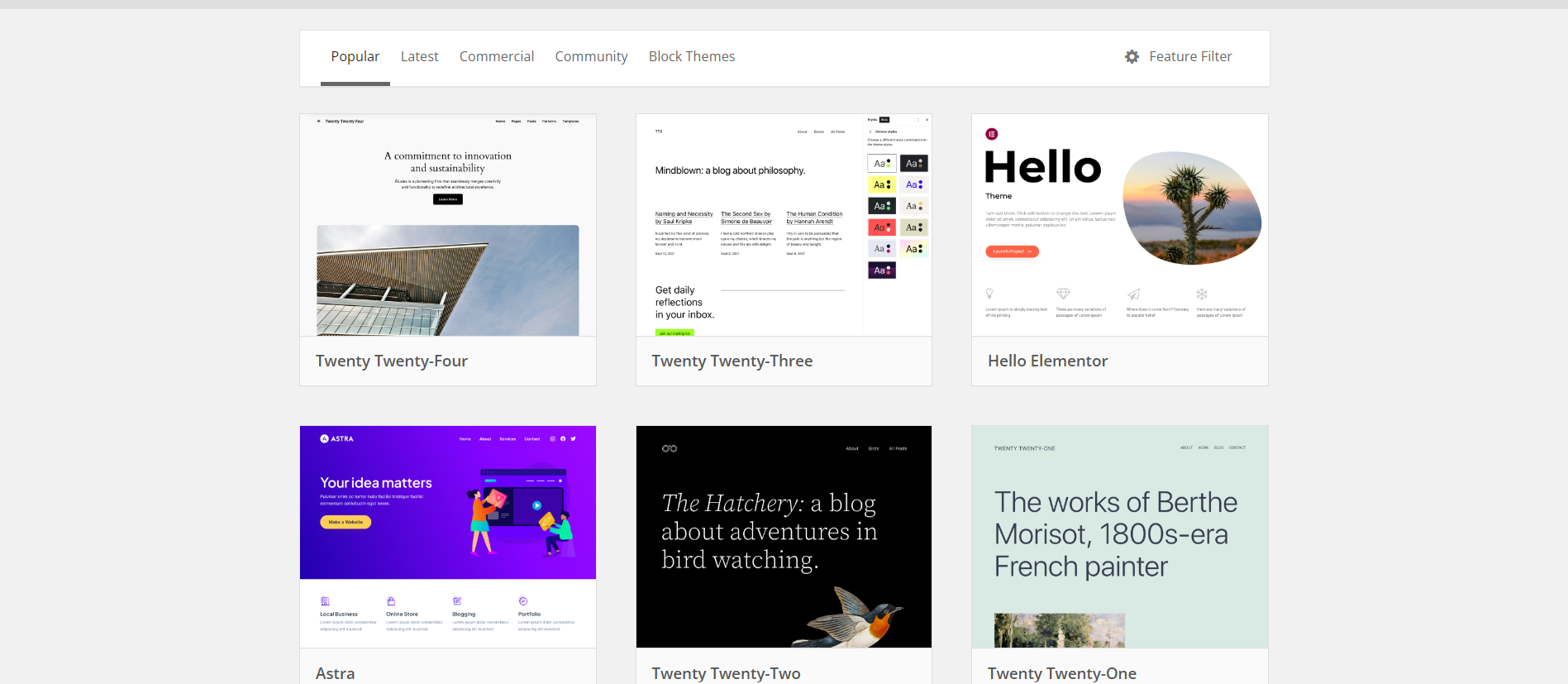
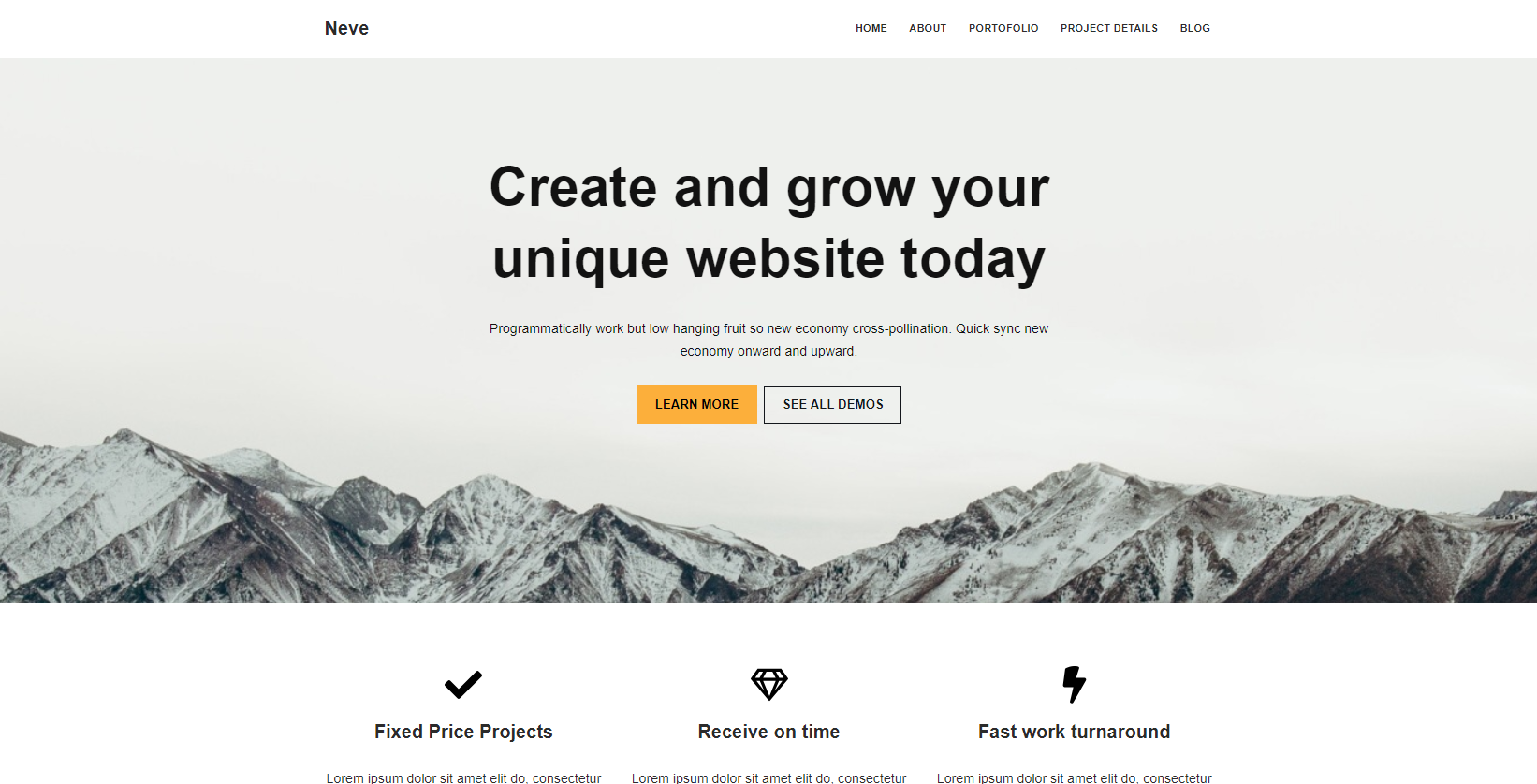
Compared to WordPress, Hostinger Website Builder offers an extensive collection of over 140 templates across various categories, including business, portfolio, blog, ecommerce, restaurant, and landing pages. These templates are fully customizable, providing design flexibility with the ability to adjust colors, fonts, layouts, and incorporate unique brand elements, while ensuring mobile responsiveness for optimal viewing on all devices.
Hostinger Website Builder Themes
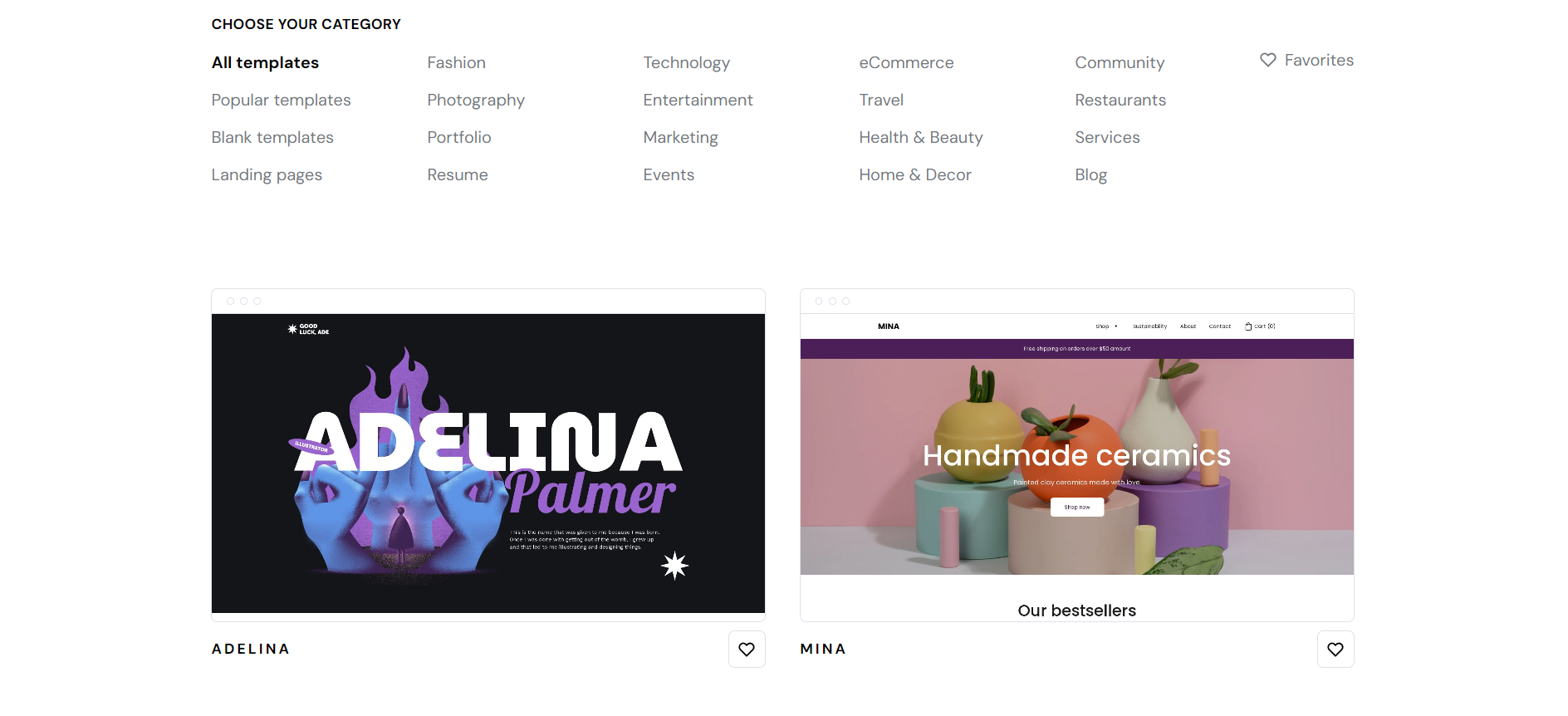

Get a head start on website creation with AI
Create a custom website tailored to your business needs 10X faster with 10Web AI Website Builder!
Ease of use
Ease of useReflects the platform’s overall user-friendliness.Score
Components:
- Learning curve (40%): Quickness and ease of getting started.
- Interface design (30%): Simplicity and intuitiveness of layout.
- User guidance (20%): Quality of tutorials and support.
- Flexibility (10%): Adaptability to various user skills.
 7.2
7.2
 8.3
8.3
🏆 Winner: Hostinger Website Builder
. With a score of 8.3, Hostinger Website Builder is more user-friendly than WordPress, which scored 7.2. Hostinger Website Builder’s drag-and-drop interface and real-time editing make it an ideal choice for beginners and non-technical users.
Learning Resources
🏆 Winner: WordPress
. Although both platforms offer a variety of learning resources, WordPress stands out with its extensive support network, including detailed documentation, community forums, online tutorials, and courses. This makes it beneficial for users of all skill levels.
For ecommerce
EcommerceMeasures the platform’s effectiveness in supporting online business activities.Score Components:
- Ecommerce themes and templates (20%): Variety and design of templates.
- Product management (25%): Ease of managing and organizing products.
- Payment options (25%): Variety and convenience of payment methods.
- Ecommerce features (20%): Features for managing an ecommerce store.
- Integration (10%): Compatibility with external e-commerce tools and services.
 8.4
8.4
 6.1
6.1
When it comes to ecommerce, WordPress and Hostinger Website Builder offer different experiences. WordPress, with its open-source nature, relies on plugins like WooCommerce to provide ecommerce functionalities. It offers extensive customization options, multiple payment gateway support, and a vast ecosystem of plugins. On the other hand, Hostinger Website Builder provides basic ecommerce capabilities suitable for small businesses and individual sellers. However, it has limitations in terms of a more basic feature set, fewer integrations, and potential scalability challenges compared to dedicated ecommerce platforms.
 |
 |
|
|---|---|---|
Ecommerce themes and templates |
9.2 |
6.5 |
Product page customization |
9.0 |
5.8 |
Payment processing and commissions |
7.5 |
7.0 |
POS capabilities |
6.5 |
4.5 |
Payment gateways |
8.5 |
7.5 |
Product numbers |
7.0 |
6.0 |
Additional ecommerce features |
8.0 |
6.2 |
WordPress ecommerce features:
- WooCommerce Integration
- Multiple Payment Gateway Support
- Abandoned Cart Recovery
- Ecommerce Analytics
- SEO Optimization Tools
- Extensive Plugin Ecosystem
Hostinger Website Builder ecommerce features:
- Product Catalog Management
- Inventory management
- Taxes and shipping
- Payment gateways
- Order management
- Discount coupons and promotions
Ecommerce themes & templates
WordPress offers hundreds to potentially thousands of ecommerce and WooCommerce specific themes and templates, both free and premium. Hostinger Website Builder provides over 50 ecommerce templates out of its library of 140+, covering various styles and industries. These mobile-responsive templates offer pre-built functionalities such as product pages, shopping carts, and wishlists, but compared to dedicated platforms, the selection may feel smaller, and customization options might be more limited.
Product page customization
WooCommerce on WordPress offers extensive customization for eCommerce product pages, balancing plugins, page builders, and custom coding. Advanced features like product tabs, upsells, and related products are customizable. Tools like Elementor and the Ultimate Product Catalog plugin enhance functionality, but heavy plugin use may affect site performance. In contrast, Hostinger Website Builder offers basic product page customization, including editing basic elements, adjusting layout and design, and optimizing SEO settings. However, it falls short in terms of flexibility due to limited code access, restrictions on creating entirely new custom sections, and theme-specific limitations.
Payment processing
WordPress doesn’t handle payments directly but offers plugin options for payment processing. Popular gateways include PayPal, Stripe, Authorize.Net, and Square. Hostinger Website Builder provides basic ecommerce features, supporting popular payment gateways like PayPal, Stripe, and Square with no additional platform commissions on sales. However, it lacks built-in payment processing and integrated point-of-sale capabilities, necessitating reliance on third-party gateways and separate systems for in-person transactions.
Website Editors
Website EditorsEvaluates the platforms’ website building and editing capabilities.Score Components:
- Customization tools (40%): Range and power of editing features.
- Editor usability (30%): User experience within the editor.
- Design flexibility (20%): Freedom in layout and design changes.
- Update and maintenance ease (10%): Simplicity of updating and maintaining the site.
 8.5
8.5
 7.4
7.4
🏆
Winner: WordPress
. WordPress, with a score of 8.5, offers a user-friendly interface with block-based editing, extensive styles customization, template management, page editing/creation, distraction-free modes, versatile saving options, and accessibility for users of varying skill levels. It also provides a WYSIWYG (What You See Is What You Get) interface, and changes can be applied globally, including Header and Footer templates. The editor also offers features like undo/redo, List View, Command Palette, and customization tools.
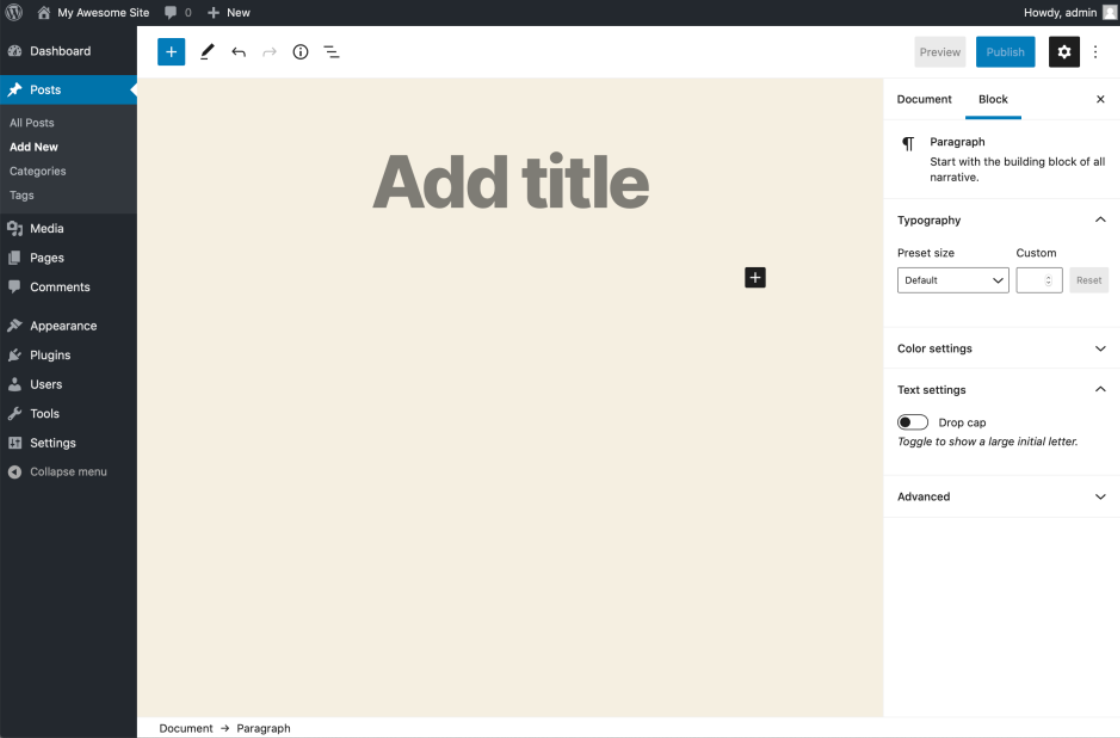
Hostinger Website Builder’s editor, scoring 7.4, is a beginner-friendly platform with a drag-and-drop interface, pre-designed templates, and visual aids for easy website creation. It offers various sections, content editing tools, SEO optimization, and ecommerce capabilities on premium plans, but has limitations in design flexibility compared to code-based platforms and may have fewer advanced features for high-volume stores. Customization options also vary based on the chosen plan.
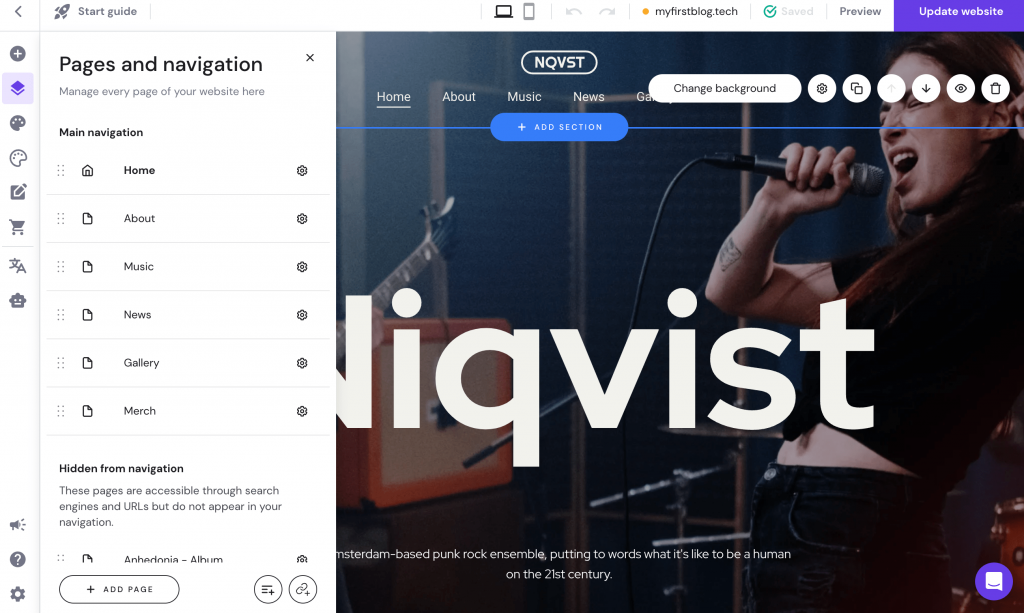
Mobile editor/app
 8.1
8.1
 5.5
5.5
🏆
Winner: WordPress
. Both WordPress and Hostinger Website Builder offer mobile editing capabilities, but they cater to different needs and skill levels. WordPress has a dedicated mobile app that allows users to manage their website on the go. You can create and edit posts, manage comments, schedule content, and analyze website traffic from your phone or tablet. However, it has some limitations compared to the web-based editor, including fewer advanced options, restricted code access, and limited design customization.
On the other hand, Hostinger Website Builder doesn’t have a dedicated mobile app. Instead, its website builder offers a mobile-friendly interface that can be accessed directly through your phone’s web browser. Despite this, WordPress scores higher in the mobile editor category due to its dedicated app and more comprehensive features.
In summary, WordPress receives a higher rating due to its dedicated mobile app and more comprehensive features, while Hostinger Website Builder offers a mobile-friendly interface but lacks a dedicated app.
Product testing options
Product Testing OptionsAssesses the options for trying out platform features before commitment.Score Components:
- Trial quality (40%): Extent and usefulness of the trial or free version.
- Feature accessibility (30%): How many features are available to test.
- Trial duration (20%): Length of the trial period.
- Ease of transition (10%): Smoothness of moving from trial to paid plans.
 8.1
8.1
 6.7
6.7
Overall Result
:
Wordpress wins
with a score of 8.1 against Hostinger Website Builder’s 6.7. WordPress, being an open-source CMS, offers a free version but no trial version or premium features testing. On the other hand, Hostinger Website Builder doesn’t offer a free version but provides a 30-day money-back guarantee during which premium features can be tested.
 |
 |
|
|---|---|---|
Free Plan |
Yes (open source software) |
No |
Trial Duration |
No | No (30-day money-back guarantee) |
Testing Premium Features |
No | Yes, during the 30-day refundable period |
Price
PriceLooks at the cost-effectiveness and value for money of each platform.Score Components:
- Plan value (40%): What each pricing tier offers.
- Transparency and clarity (30%): Clearness of pricing structures.
- Flexibility of plans (20%): Range of options to suit different budgets.
- Hidden costs (10%): Additional expenses not included in the plan.
 5.9
5.9
 9.0
9.0
Hostinger Website Builder offers more straightforward pricing with specific plans, while the cost of using WordPress depends on the hosting provider and website builder chosen.

|

|
|
|---|---|---|
Free |
Free Plan ($0/month): WordPress is open source software that is free. WordPress does not provide hosting services; so, it is necessary to purchase a domain, web hosting, and website builder subscriptions separately. While WordPress lacks built-in ecommerce, plugins like WooCommerce offer a solution. WordPress offers an extensive variety of templates and designs. WordPress lacks a built-in AI-assisted builder, but its open-source nature allows for an ecosystem of plugins and themes incorporating AI for website building. |
No offering at this amount. |
$10-$13 |
No offering at this amount. |
Premium website ($11.99/month): Build 1 website with 10 GB storage, 100 GB bandwidth, custom domain & email, social media integration & SEO tools. Value for price: 7.5 |
$13+ |
No offering at this amount. |
Business website builder ($13.99/month): Build 1 website with custom domain & emails, AI website builder, AI image generator, AI writer, ecommerce features, marketing integrations and 0% transaction fees Value for price: 8.5 |
location. As a result in rare cases the prices displayed here can differ from the ones you see on their
websites.
Hosting quality
Hosting
qualityExamines the reliability and performance of the hosting solutions.Score Components:
- Uptime (40%): Consistency and reliability of website availability.
- Speed (30%): Loading times and performance.
- Bandwidth and storage (20%): Sufficiency of resources provided.
- Data centers (10%): Quality and distribution of hosting infrastructure.
 0
0
 7.2
7.2
Winner: Hostinger Website Builder
. Hostinger Website Builder offers a variety of hosting options, including shared, cloud, and VPS hosting, with a 99.9% uptime guarantee. Their data centers are located across the globe, ensuring fast and reliable service. On the other hand, WordPress does not directly provide hosting services, and the quality of hosting depends on the chosen hosting provider.
 |
 |
|
|---|---|---|
Do they offer hosting? |
No, WordPress itself does not directly provide hosting services. | Yes, included in all paid plans |
Data Centers: |
Data centers depend on hosting providers | Data Centers across the globe: USA, Europe, Asia, South America |
Type of hosting: |
WordPress itself isn’t a hosting platform, there are various options when choosing the type of hosting for websites built with WordPress, such as: Shared Hosting, VPS Hosting, Dedicated Server Hosting, Managed WordPress Hosting, Cloud Hosting | Shared Hosting, Cloud Hosting, WordPress Hosting, VPS Hosting |
Uptime: |
Uptime & uptime guarantee depends on hosting provider | 99.9% |
Uptime Guarantee: |
Depends on hosting provider | Yes, 99.9% |
Website Speed Optimization
Website Speed OptimizationEvaluates optimization of website loading timesScore Components:
- PageSpeed Score (30%): Google’s score indicating performance optimization.
- Loading Time (30%): The average time until a website is fully interactive.
- Mobile Optimization (15%): Optimization effectiveness for mobile devices.
- Resource Optimization (15%): Optimizing images, scripts, and other heavy resources.
- CDN Usage (10%): Use of CDN to enhance speed across geolocations.
 6.5
6.5
 8.2
8.2
🏆 Winner: Hostinger Website Builder
Both WordPress and Hostinger Website Builder prioritize website performance and page speed, but Hostinger Website Builder takes the lead with a higher Website Speed Optimization score.
 |
 |
|
|---|---|---|
Focus |
Plugin optimization, Image optimization |
LiteSpeed Cache, Cloudflare CDN, MariaDB |
Performance Tools |
Core Web Vitals, WP Rocket, Hummingbird |
LiteSpeed Cache, Cloudflare CDN |
Key Strategies |
No specific strategy, relies on resources |
LiteSpeed Cache, Cloudflare CDN, MariaDB |
Load Times |
Varies widely, dependent on optimization |
2-3 seconds average |
Page Speed Scores Range |
Scores vary; influenced by apps, images |
80-95+/100 |
Core Web Vitals Improvement |
Analyze CWV, optimize images, minimize plugins, use lazy loading, employ a CDN |
Reduced LCP, improved FID, minimized CLS |
WordPress, an open-source content management system, does not have a specific strategy for website speed optimization. However, it provides numerous resources on how to optimize your website. These include analyzing Core Web Vitals (CWV), choosing a reliable host, optimizing images, minimizing plugins, using lazy loading, and employing a Content Delivery Network (CDN). Tools like Core Web Vitals, WP Rocket, and Hummingbird are recommended for optimization. The load times and PageSpeed scores vary widely, depending on the optimization.
On the other hand, Hostinger Website Builder, a tool offered by the web hosting company Hostinger, has specific strategies for website speed optimization. These include LiteSpeed Cache, Cloudflare CDN, MariaDB database, and browser caching. These strategies have led to an average load time of 2-3 seconds and PageSpeed scores ranging from 80 to 95+/100. Hostinger has also made notable strides in enhancing Core Web Vitals (CWV) performance. They successfully reduced Largest Contentful Paint (LCP) through LiteSpeed Cache and Cloudflare CDN, improved First Input Delay (FID) with server-side optimizations, and minimized Cumulative Layout Shift (CLS) through CSS optimizations. These efforts have led to significant improvements in overall CWV scores.
Get a head start on website creation with AI
Create a custom website tailored to your business needs 10X faster with 10Web AI Website Builder!
Plugins and integrations
Plugins and integrationsMeasures the range and effectiveness of additional plugins and integrations.Score Components:
- Variety of options (40%): Range of available add-ons.
- Integration smoothness (30%): Ease of integrating plugins into the site.
- Quality of plugins (20%): Functionality and reliability of the options.
- Custom integration capabilities (10%): Support for custom or third-party integrations.
 8.8
8.8
 4.7
4.7
🏆 Winner: WordPress.
Wordpress scores a high 8.8, offering an impressive range of over 60,000 free plugins. This open-source CMS is known for its extensive customization options, making it a top choice for users who want to tailor their websites to their specific needs. On the other hand, Hostinger Website Builder, with a score of 4.7, offers around 20 free add-ons. While it covers basic needs, it falls short when compared to the vast array of options provided by WordPress.
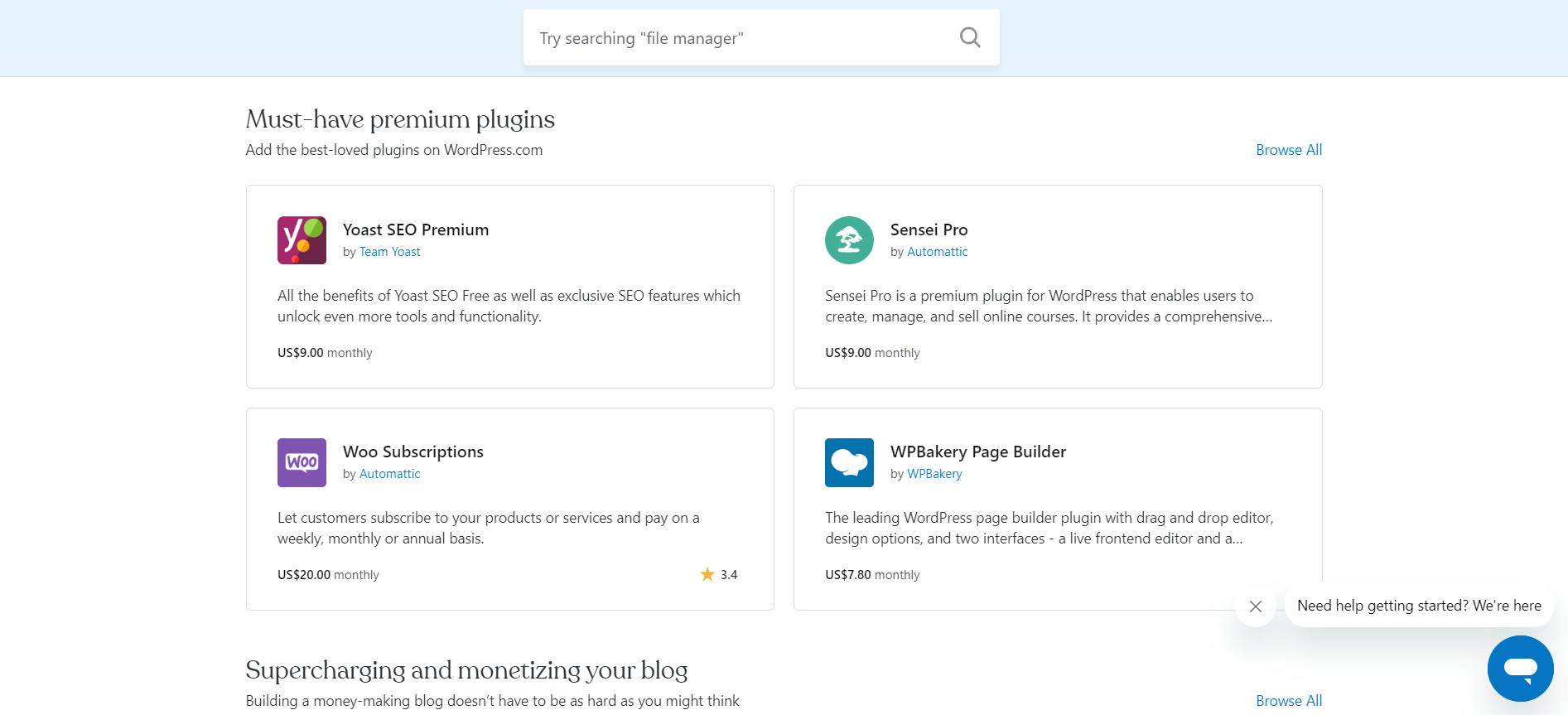
Marketing Features
Design FunctionalitiesRepresents how well each platform allows for creative design and customization of websites.Score Components:
- Template Variety (30%): Range and quality of design templates.
- Customization (30%): Flexibility and options for design alterations.
- User Interface (20%): Ease and intuitiveness of the design process.
- Responsiveness (10%): Adaptability to different devices and screen sizes.
- Innovation (10%): Unique design features and tools.
 8.0
8.0
 5.8
5.8
🏆
Overall Winner: WordPress
. WordPress offers more comprehensive and advanced marketing features, largely due to its extensive plugin ecosystem. Hostinger Website Builder provides more basic, built-in features, making it a simpler option for beginners or those with less complex needs.
 |
 |
|
|---|---|---|
SEO Tools |
||
Email Marketing |
✓ (via plugins) |
✓ (via integrations) |
Blogging |
||
Social Media Integration |
Plugins for direct linking, automatic posting, and social feeds display |
Simple social media links and sharing options |
Analytics and Reporting |
In-depth analysis via plugins like Google Analytics for WordPress |
Basic analytics for website traffic and performance |
Ads and Promotions |
Support for Google Ads and ad management through various plugins |
Limited direct ad tools but supports integrations for ad management |
Customer Support
Customer supportEvaluates the quality and availability of support options.Score Components:
- Response time (40%): Speed of support responses.
- Support quality (30%): Effectiveness and helpfulness of the support.
- Availability (20%): Range of support channels (phone, chat, email).
- Resource richness (10%): Quality of self-help and educational materials.
 5.0
5.0
 7.2
7.2
🏆 Winner: Hostinger Website Builder
. In the comparison of WordPress vs Hostinger Website Builder, Hostinger Website Builder takes the lead with its comprehensive customer support options. Hostinger offers 24/7 live chat, a ticketing system with email responses within 24 hours, and phone support during specified hours. This ensures users have multiple avenues to seek help and resolve issues promptly.
WordPress, being an open-source CMS, lacks direct customer support. Users rely on community forums, the WordPress codex, and support from hosting providers or plugin and theme developers. While the community is vast and helpful, the absence of official support can be a drawback for users needing immediate assistance.
Security
SecurityLooks at the platforms’ security measures and data protection.Score Components:
- Data protection (40%): Safeguards for user and customer data.
- SSL and encryption (30%): Implementation of secure connections.
- Compliance (20%): Adherence to industry security standards.
- Regular updates (10%): Frequency of security updates and patches.
 6.7
6.7
 8.2
8.2
🏆
Winner: Hostinger Website Builder
. Hostinger Website Builder takes the lead in security with a score of 8.2, compared to WordPress’s 6.7. Hostinger provides robust security measures including regular updates, advanced firewalls, DDoS protection, anti-malware scans, and regular backups. They also implement data security measures like database encryption, SSL certificates, two-factor authentication, and offer PCI-compliant hosting for ecommerce sites.
WordPress, on the other hand, provides numerous functionalities and resources to enhance website security effectively. However, the approach to private data storage and protection can vary depending on the hosting provider, which may require additional effort from the user’s side.
AI Capabilities
AI capabilitiesMeasures the effectiveness of AI-driven features and tools.Score Components:
- Automation efficiency (40%): Impact of AI on streamlining processes.
- Personalization (30%): AI-driven customization for users or customers.
- AI-Assisted design (20%): Role of AI in website design and functionality.
- Data analysis (10%): Use of AI in interpreting user data and analytics.
 6.1
6.1
 6.1
6.1
 |
 |
|
|---|---|---|
AI-assisted Builder |
Lacks built-in AI builder, but allows for AI plugin integration |
AI Website Builder automates aspects of website creation |
AI Ecommerce Features |
Lacks built-in AI ecommerce features, but allows for AI plugin integration |
AI Shop Generator, automated product descriptions, smart stock management |
AI Content Generation |
Lacks built-in AI content generation, but allows for AI plugin integration |
AI Writer tool for quick and easy content creation |
Additional AI Features |
Wide range of AI powered plugins and tools |
AI Image Generator, AI Logo Maker, AI Heatmap, SEO Check tool |
🏆 Winner: Tie
. Both WordPress and Hostinger Website Builder have the same AI capabilities score of 6.1. WordPress, being an open-source platform, allows for the integration of various AI plugins, making it flexible and customizable. Hostinger Website Builder, on the other hand, has built-in AI tools that automate aspects of website creation, making it user-friendly and accessible. However, both platforms have their own limitations and areas for improvement in terms of AI capabilities.
User Management
User ManagementAssesses the platforms’ capabilities in managing user roles, permissions, and accessibility.Score Components:
- Role Customization (40%): Flexibility in creating and defining user roles and
permissions. - Ease of Management (30%): User interface and tools for managing users.
- Access Control (20%): Effectiveness of access control measures for different user
levels. - Scalability (10%): Ability to manage a growing number of users efficiently.
 8.8
8.8
 6.3
6.3
🏆 Winner: WordPress
. WordPress and Hostinger Website Builder offer different approaches to user management.
- WordPress allows editing access based on user roles and additional controls. User roles, ranging from Super Admin to Subscriber, dictate the level of permissions, while plugins and controls such as role management plugins and revision control offer further customization for specific editing rights and collaboration.
- The number of users who can edit a Hostinger website depends on the hosting plan and the Website Builder edition chosen. For shared hosting, the Free plan allows only 1 user, Starter allows 2, Premium allows 5, and Business offers unlimited collaborators. In Cloud Hosting, Startup allows 2, Professional allows 5, and Enterprise offers unlimited collaborators. The Website Builder Pro edition, available on all plans, allows up to 10 collaborators.
WordPress User Roles and Access Levels:
| Role | Description | Access Highlights |
|---|---|---|
| Super Admin | Manages the entire network in WordPress Multisite. | Network admin, manage sites, users, plugins, themes. |
| Administrator | Full access within a single site. | Manage plugins, themes, users, all posts/pages. |
| Editor | Manages and publishes content, including others’ posts. | Edit/publish all posts, manage comments, categories. |
| Author | Publishes and manages their own posts. | Write, edit, publish own posts, upload files. |
| Contributor | Writes and edits their own posts but cannot publish. | Write, edit own posts (no file uploads or publishing). |
Additional Features
 |
 |
|
|---|---|---|
SSL Certificate |
||
Custom Domain |
||
Free Custom Domain Included |
||
International Domains |
||
Mobile Responsive |
||
Page Speed |
||
Website Builder Mobile App |
||
Convert a Website To An App |
||
Website Analytics |
||
Multilingual Sites |
||
Multiple Users |
WordPress vs Hostinger Website Builder: User Feedback
WordPress receives praise for its user-friendliness, cost-effectiveness, extensive themes and plugins, customization options, and supportive community. However, users mention technical challenges, security concerns, a learning curve, and a lack of direct support. Overall, it remains a widely used and versatile platform, especially beneficial for startups and small businesses.
Hostinger Website Builder is favored for its ease of use, affordability, and strong customer support, making it an attractive option for users, especially those new to website building. However, there are areas for improvement, particularly in offering more diverse templates, enhancing ecommerce features, and streamlining customer support responsiveness. These insights reflect a balance of satisfaction with areas that could benefit from further development.
The making of this blog
We followed a clear, step-by-step process to write and research this article.
WordPress vs Hostinger Website Builder: FAQ
Which platform is better for beginners, WordPress or Hostinger Website Builder?
Can I use both WordPress and Hostinger Website Builder for ecommerce?
How do WordPress and Hostinger Website Builder differ in terms of customization and design flexibility?
What are the major differences in pricing and value between WordPress and Hostinger Website Builder?
Which platform offers better customer support, WordPress or Hostinger Website Builder?









